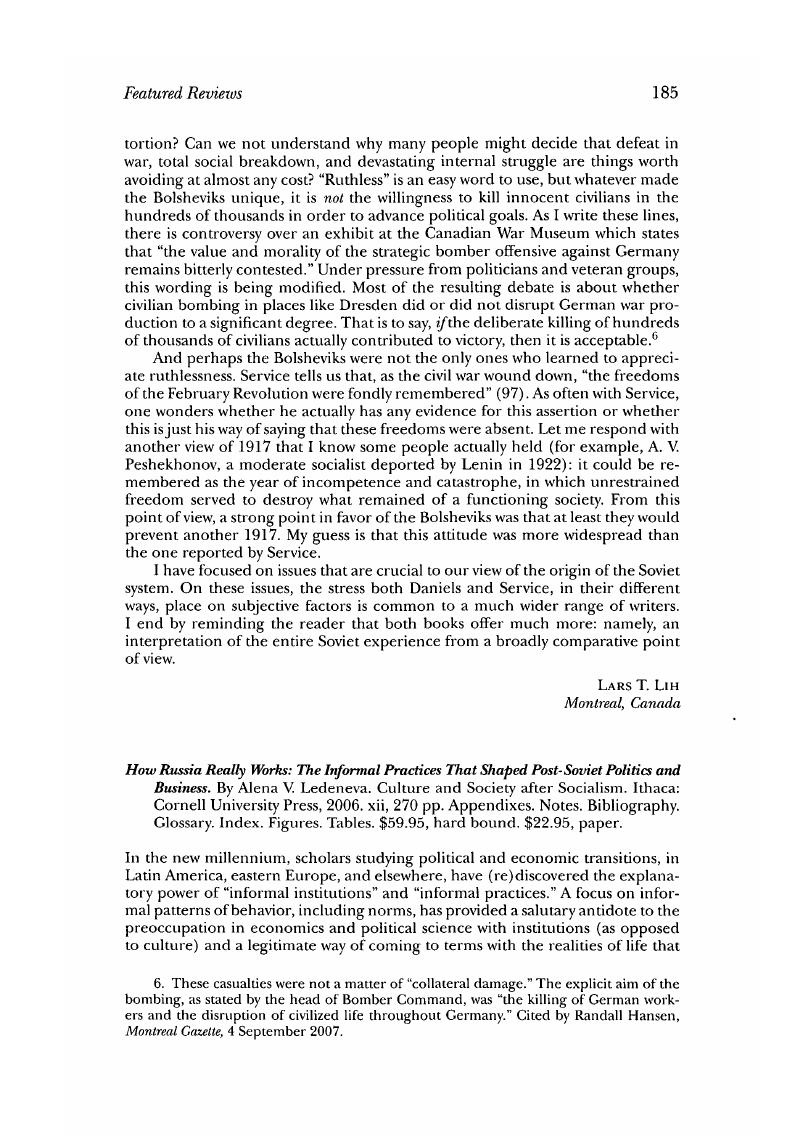Article contents
How Russia Really Works: The Informal Practices That Shaped Post-Soviet Politics and Business. By Alena V. Ledeneva. Culture and Society after Socialism. Ithaca: Cornell University Press, 2006. xii, 270 pp. Appendixes. Notes. Bibliography. Glossary. Index. Figures. Tables. $59.95, hard bound. $22.95, paper.
Published online by Cambridge University Press: 27 January 2017
Abstract

- Type
- Featured Reviews
- Information
- Copyright
- Copyright © Association for Slavic, East European, and Eurasian Studies. 2008
References
1. Helmke, Gretchen and Levitsky, Steven, “Informal Institutions and Comparative Politics: A Research Agenda,” Perspectives on Politics 2 (December 2004): 725-40CrossRefGoogle Scholar. See also Vladimir Gel'man, “The Unrule of Law in the Making: The Politics of Informal Institution Building in Russia,” Europe-Asia Studies 56, no. 7 (November 2004): 1021-41; Anna Grzymala-Busse, “Informal Institutions and the Post-Communist State” (unpublished article, 2004); Solomon, Peter H. Jr, “Informal Practices in Russian Justice: Probing the Limits of Post-Soviet Reform,” in Feldbrugge, Ferdinand, ed., Russia, Europe, and the Rule of Law (Leiden, 2007), 79–92.Google Scholar
2. Berliner, Joseph S., Factory and Manager in the USSR (Cambridge, Mass., 1957), esp. chaps. 10 and 11CrossRefGoogle Scholar; Shenfield, Stephen D., “The Struggle for Control over Statistics,” in Millar, James R., ed., Cracks in the Monolith (Armonk, N.Y., 1992), 89–102.Google Scholar
3. Ledeneva, Alena V, Russia's Economy oj'Favours: Blat, Networking, andlnformalExchange (Cambridge, Eng., 1998)Google Scholar; Lovell, Stephen, Ledeneva, Alena, and Rogachevskii, Andrei, eds., Bribery and Blat in Russia (London, 2000)Google Scholar; Ledeneva, Alena V and Kurkchiyan, Marina, eds., Economic Crime in Russia (The Hague, 2000)Google Scholar;
4. See also Maria Popova, “Watchdogs or Attack Dogs? The Role of the Russian Courts and the Central Election Commission in the Resolution of Electoral Disputes,” Europe-Asia Studies58, no. 3 (May 2006): 391-414.
5. Volkov, Vadim, “The Selective Use of State Capacity in Russia's Economy: Property Disputes and Enterprise Takeovers, 1998-2002,” in Kornai, Janos, Rothstein, Bo, and Rose-Ackerman, Susan, eds., Creating Social Trust in Post-Socialist Transition (New York, 2004), 126-47CrossRefGoogle Scholar.
6. Kurkchiyan, Marina, “The Illegitimacy of Law in Post-Soviet Societies,” in Galligan, Denis J. and Kurkchiyan, Marina, eds., Law and Informal Practices: The Post-Communist Experience (Oxford, 2003), 25–46.Google Scholar
- 1
- Cited by


